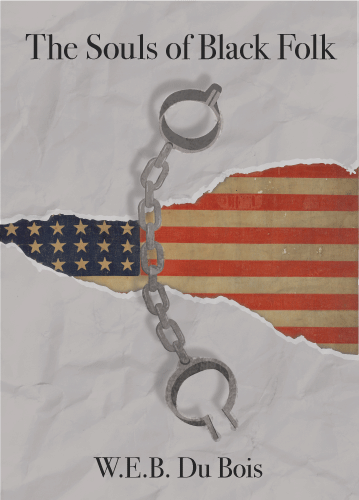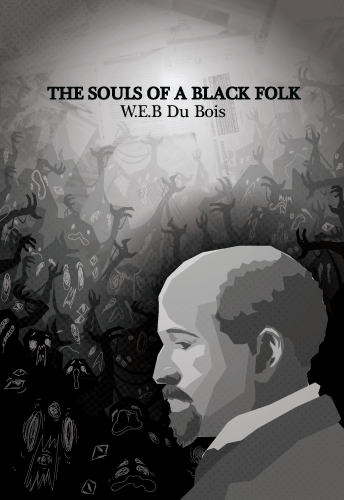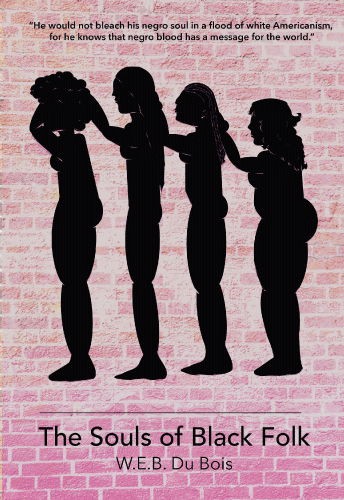The Souls of Black Folk
Reflective Writing
- In The Souls of Black Folks, W.E.B. DuBois writes: “One ever feels his two-ness,—an American, a Negro; two souls, two thoughts, two unreconciled strivings” (11).
- Make a list of some of your identities.
- Would you describe your identity as divided or unified? In conflict or in harmony? Do you ever feel that other people fail to understand/see who you are, because of one aspect of your identity?
- “there are today no truer exponents of the pure human spirit of the Declaration of Independence than the American Negroes” (Du Bois 16).
- Is it possible to argue that the “striving” for rights and economic improvement that is carried out by minority groups in America today reflects Du Bois claim that the struggle of the “outcast” best reflects the spirit of American liberty?
- Can you relate your views to anything in particular, such as ‘Black Lives Matter,’ Gay Rights, Transgender Rights, workers’ unions, feminism, etc?
- Du Bois’ states that “we black men seem the sole oasis of simple faith and reverence in a dusty desert of dollars and smartness” (16)
- Is it possible to argue that new immigrants and other minorities in America can contribute something new and improving to the culture of America, or do such social groups need to simply fit into the existing ‘American Way’?
- Can you share any personal experience or social knowledge about the ways in which minorities and/or immigrants are a) placed under pressure to fit in with the rest of america; b) do/can offer some new insights and experiences to the rest of America that help to re-define what it means to live and work here?
Student Work
DD114 Digital Illustration in collaboration with Core Books at Hostos
Professor Catherine Lewis | Fall 2021

KEVIN RICHIEZ
DD114 Digital Illustration | Fall 2021

WILLIAM SANTANA
DD114 Digital Illustration | Fall 2021

DORRIS ROBLES
DD114 Digital Illustration | Fall 2021
Short Questions for Discussion & Writing
Du Bois’ “Of Our Spiritual Strivings” sets out to describe the origins, meanings, and potential usefulness of the post-Civil War plight of African-Americans. The social experiences of his race have produced what he calls a form of “double-consciousness” that has, in turn, shaped the psychological and cultural life of African-Americans. The “striving” of a “double self” makes for a complex identity that cannot be easily simplified or translated into an efficiently coherent blue-print for improving things. Du Bois’ evaluation of “double-consciousness” involves its own form of double thinking or ambivalence. It is important that we appreciate the ambiguities (doubleness and uncertainty) involved in Du Bois’ reflections on “double-consciousness” in order to get a better grasp on what he is saying. Reading the selected passages below and addressing their accompanying questions will help us to focus our reading and thinking in a way that should make Du Bois’ difficult text more easily understandable:
- “Between me and the other world there is ever an unasked question … How does it feel to be a problem?” (9).
- What does Du Bois mean by the “other world” here, and what does its “unasked question” mean to him?
- “It is in the early days of rollicking boyhood that the revelation first bursts upon one, all in a day, as it were. I remember well when the shadow swept across me. I was a little thing, away up in the hills of New England, where the dark Housatonic winds between Hoosac and Taghkanic to the sea. In a wee wooden schoolhouse, something put it into the boys’ and girls’ heads to buy gorgeous visiting-cards—ten cents a package—and exchange. The exchange was merry, till one girl, a tall newcomer, refused my card,—refused it peremptorily, with a glance. Then it dawned upon me with a certain suddenness that I was different from the others; or like, mayhap, in heart and life and longing, but shut out from their world by a vast veil. I had thereafter no desire to tear down that veil, to creep through; I held all beyond it in common contempt, and lived above it in a region of blue sky and great wandering shadows. That sky was bluest when I could beat my mates at examination-time, or beat them at a foot-race, or even beat their stringy heads” (10).
- What does Du Bois realize in this scene?
- What does he mean by the word “veil”?
- What is Du Bois’ attitude toward his new realization? Identify specific language that DuBois uses to indicate his attitude.
- Does Du Bois find the experience of having a “veil” cast over his life a positive thing, a negative thing, or some mixture of both?
- Have you ever experienced a “veil” in your life, similar to what Du Bois describes? Write whatever you feel comfortable discussing. In what ways was it similar, and in what ways different?
- “With other black boys the strife was not so fiercely sunny: their youth shrunk into tasteless sycophancy, or into silent hatred of the pale world around them and mocking distrust of everything white; or wasted itself in a bitter cry, Why did God make me an outcast and a stranger in mine own house?” (10).
- Why might the experience of the “veil” have been different (less “sunny”) for other “black boys” than Du Bois?
- He describes one type of reaction or coping mechanism as “tasteless sycophancy.” What does he mean by that? Look up the words if you need to.
- What does he mean by “silent hatred” as another way of coping with the “veil”?
- What does he mean by saying that the “youth” of some “black boys” became “wasted” in a “bitter cry”?
- How might a single individual express all the reactions described by Du Bois in different moments or contexts? Can you find any examples of these different reactions in popular culture today, or broader society?
- How does Du Bois use the words “strife” and “striving” in the text, and how is striving related to the different reactions to the veil he describes?
- “the Negro is a sort of seventh son, born with a veil, and gifted with second-sight in this American world, – a world which yields him no true self-consciousness, but only lets him see himself through the revelation of the other world. It is a peculiar sensation, this double-consciousness, this sense of looking at one’s self through the eyes of others, of measuring one’s soul by the tape of a world that looks on in amused contempt and pity” (10-11).
- What does Du Bois mean by saying that African-Americans are born with a “veil” that forces them to look at themselves through the “revelations of the other world … through the eyes of others”?
- What is meant by this idea of “double consciousness” as something that “yields … no true self-consciousness”? Why is true self-consciousness impossible while experiencing double consciousness?
- Why is the “veil” and its “double-consciousness” referred to as something that leaves African-American people “gifted”? Is he describing “double-consciousness” as a special power? Or, is it a curse? Or, is it possibly a mixture of both?
- What does it mean when he says that the “the other world … looks on in amused contempt and pity” at African-Americans? What’s wrong with receiving pity from someone in this context?
- “The history of the American Negro is the history of this strife, – this longing to attain self-conscious manhood, to merge his double self into a better and truer self. In this merging he wishes neither of the older selves to be lost. He would not Africanize America, for American has too much to teach the world and Africa. He would not bleach his Negro soul in a flood of white Americanism, for he knows that Negro blood has a message for the world” (11).
- What does Du Bois mean by stressing that African-Americans seek to keep the special qualities of their “double self” while “merging” those two halves into “a better and truer self,” reflective of a state of “self-conscious manhood”? How might self-realization like this be achieved?
- Is the concept of “strife” mentioned here (note that he uses the word “striving” elsewhere also) seen as a positive or negative experience? Explain your answer.
- “the facing of so vast a prejudice could not but bring the inevitable self-questioning, self-disparagement, and lowering of ideals which ever accompany repression and breed in an atmosphere of contempt and hate. Whisperings and portents came borne upon the four winds: Lo! We are diseased and dying, cried the dark hosts” (15).
- What does this passage have to say about how oppressed people internalize (draw into themselves in a way that they come to accept and even believe) external forms of prejudice and mistreatment?
- How does this passage add complexity to the notion of the “veil” that is held up by the “other world,” and which brings about what Du Bois calls the “double-consciousness” of African-Americans?
- The reference to “[w]hisperings and portents … borne upon the four winds” are strange and yet interesting. How does his use of language here help to symbolize the ways in which prejudice is spread and then internalized by its victims?
- “work, culture, liberty, – all these we need, not singly but together, not successively but together, each growing and aiding each, and all striving toward that vaster ideal that swims before the Negro people, the ideal of human brotherhood , gained through the unifying ideal of Race; the ideal of fostering and developing the traits and talents of the Negro, not in opposition to or contempt for other races, but rather in conformity to the greater ideals of the American Republic, in order that some day on American soil two world races may give each to each those characteristocs both so sadly lack” (15-16).
- Having read through “Of Our Spiritual Strivings,” what do you think Du Bois means by “work, culture, liberty” in terms of the lives of African-Americans?
- Du Bois talks about developing “the unifying ideal of Race” in a way that does not show “contempt for other races” but is “in conformity to the greater ideals” that are shared across races in America. How is Du Bois trying here to reconcile an “ideal of Race” with “ideals of the Republic” that are non-specific to race, creed, or code?
- What does Du Bois mean when he says that both races may share together by each giving to the other “those characteristics both so sadly lack”?
- How does this passage echo the values of the founding fathers that we looked at earlier in the course? How does it re-define them?
- “We the darker ones come even now not altogether empty-handed: there are to-day no truer exponents of the pure human spirit of the Declaration of Independence than the American negroes …we black men seem the sole oasis of simple faith and reverence in a dusty desert of dollars and smartness” (16).
- What positive ideas about African-American life and culture (including the experience of “double-consciousness’) are being promoted here?
- What does Du Bois mean by “a dusty desert of dollars and smartness”? Why does he use the word “smartness” to describe something as unappealing as a desert?
- Why might Du Bois think that African-Americans are “the sole oasis” in this desert?
Formal Essay Prompts
Goal: In this assignment, you will answer one of the questions below using your own analysis as well as evidence from the articles distributed in class. Your essay should be 4 typed double-spaced pages and should include a Works Cited page (page 5). Your essay should be focused, clearly written, well-organized, and should use correct MLA citation.
- Using evidence from W.E.B DuBois’ “Of Our Spiritual Strivings,” explain the meaning of “the veil” and “double-consciousness.” Then, elaborate its implications: how might the veil and its related experiences of double-consciousness be empowering or disabling? How might these parts of the African-American experience contribute usefully to American culture and politics?
- Using evidence from W.E.B DuBois’ “Of Our Spiritual Strivings,” explain how the experience of double-consciousness relates to the “unreconciled strivings” of seeing yourself as others see you, and wanting to see yourself in ways that are contrary to how others see you. Next, explain how this internal conflict relates to Du Bois’ discussion of the experiences of African-Americans during his time, and how it might still be relevant to the experiences of minorities in America today. What challenges does this experience pose for the Declaration of Independence’s statement that the life, liberty, and the pursuit of happiness are “self-evident” and “unalienable”?
- Du Bois spends a good deal of his essay discussing how fair and equal access to voting, work, and education have been difficult for African-Americans since slavery. He talks about how these problems need to be addressed in order to improve the lives of African-Americans and, in doing so, bring about an overall renewal of the promises of American democracy. How is Du Bois drawing upon the founding of the U.S. and the Declaration of Independence in order to discuss the struggle of African-Americans? In what ways does Du Bois’ essay return to the ideals of American independence, revive them, or reinterpret them? What new insights is he adding to the definition of American freedom elaborated by Jefferson, Madison, Lincoln, or Douglass?
- Du Bois is interested in the psychological and cultural experiences of race that go beyond differences in political rights, economic advantages, or educational qualifications. He focuses on how the cultural “soul” of African-Americans has been shaped by “the veil” and the competing of “double aims” that it has produced. Why does he see this experience as something important, and how might understanding it be central to efforts to improve the material (political rights, economic advantages, educational opportunities) lives of African-Americans? In answering this question, consider whether his view of African-American culture as a “sole oasis … in a dusty desert of dollars and smartness” adds a new dimension to the founding fathers’ concept of America as a place of liberty and prosperity.

This entry is licensed under a Creative Commons Attribution-NonCommercial-ShareAlike 4.0 International license.


